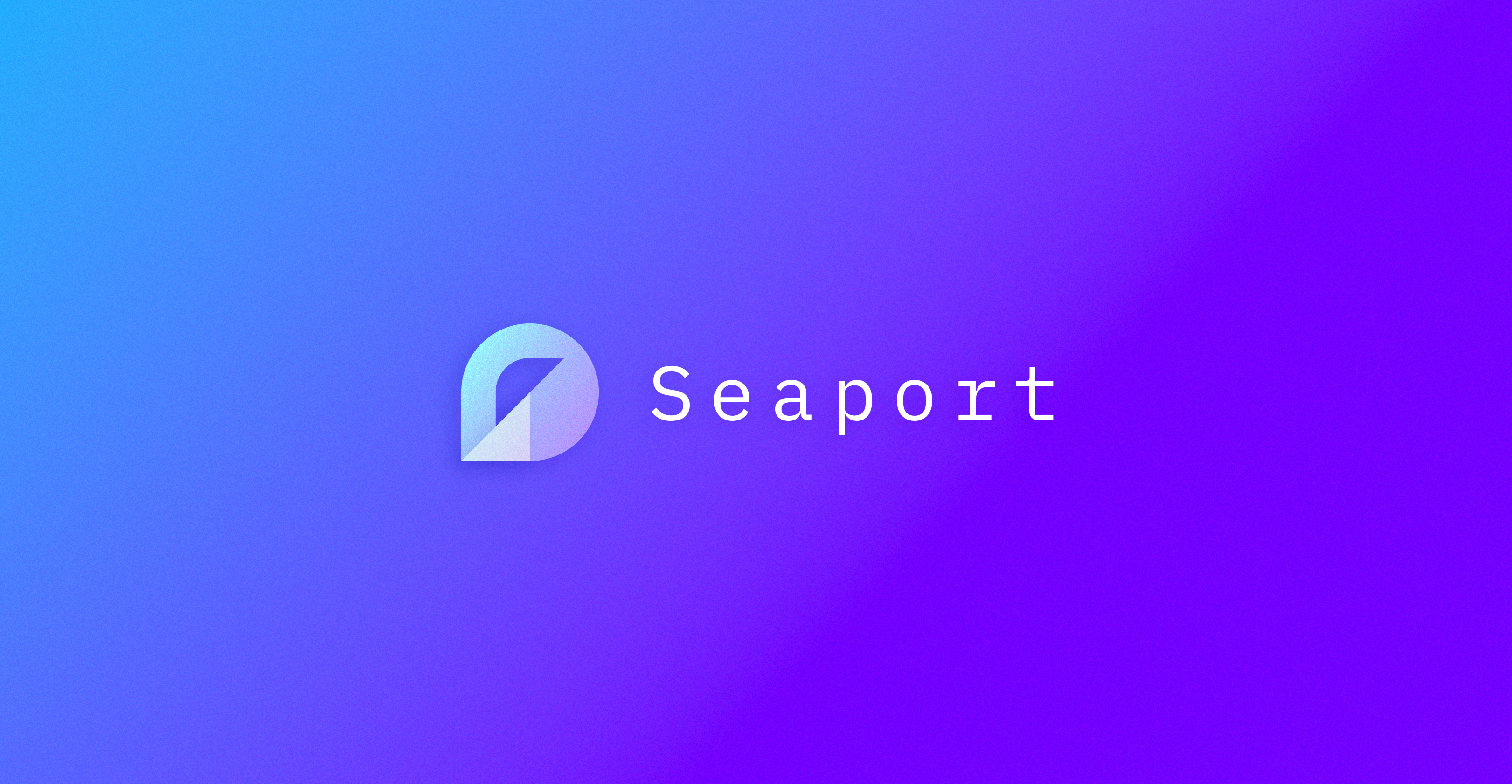Seaport is a new marketplace protocol for safely and efficiently buying and selling NFTs.
Seaport is a marketplace protocol for safely and efficiently buying and selling NFTs. Each listing contains an arbitrary number of items that the offerer is willing to give (the "offer") along with an arbitrary number of items that must be received along with their respective receivers (the "consideration").
See the documentation, the interface, and the full interface documentation for more information on Seaport.
| Network | Seaport 1.1 | ConduitController |
|---|---|---|
| Ethereum | ||
| Rinkeby | ||
| Goerli | ||
| Kovan | ||
| Polygon | ||
| Mumbai | ||
| Optimism | ||
| Optimistic Kovan | ||
| Arbitrum | ||
| Arbitrum Rinkeby | ||
| Avalanche Fuji | ||
| Avalanche C-Chain | ||
| Gnosis Chain | ||
| BSC |
To be deployed on other EVM chains, such as:
- Klaytn
- Baobab
- Skale
- Celo
- Fantom
- RSK
To deploy to a new EVM chain, follow the steps outlined here.
graph TD
Offer & Consideration --> Order
zone & conduitKey --> Order
subgraph Seaport[ ]
Order --> Fulfill & Match
Order --> Validate & Cancel
end
Validate --> Verify
Cancel --> OrderStatus
Fulfill & Match --> OrderCombiner --> OrderFulfiller
OrderCombiner --> BasicOrderFulfiller --> OrderValidator
OrderCombiner --> FulfillmentApplier
OrderFulfiller --> CriteriaResolution
OrderFulfiller --> AmountDeriver
OrderFulfiller --> OrderValidator
OrderValidator --> ZoneInteraction
OrderValidator --> Executor --> TokenTransferrer
Executor --> Conduit --> TokenTransferrer
Executor --> Verify
subgraph Verifiers[ ]
Verify --> Time & Signature & OrderStatus
end
For a more thorough flowchart see Seaport diagram.
To install dependencies and compile contracts:
git clone https://github.com/ProjectOpenSea/seaport && cd seaport
yarn install
yarn buildTo run hardhat tests written in javascript:
yarn test
yarn coverageNote: artifacts and cache folders may occasionally need to be removed between standard and coverage test runs.
To run hardhat tests against reference contracts:
yarn test:ref
yarn coverage:refTo profile gas usage:
yarn profileSeaport also includes a suite of fuzzing tests written in solidity with Foundry.
To install Foundry (assuming a Linux or macOS system):
curl -L https://foundry.paradigm.xyz | bashThis will download foundryup. To start Foundry, run:
foundryupTo install dependencies:
forge install
To precompile contracts:
The optimized contracts are compiled using the IR pipeline, which can take a long time to compile. By default, the differential test suite deploys precompiled versions of both the optimized and reference contracts. Precompilation can be done by specifying specific Foundry profiles.
FOUNDRY_PROFILE=optimized forge build
FOUNDRY_PROFILE=reference forge buildThere are three Foundry profiles for running the test suites, which bypass the IR pipeline to speed up compilation. To run tests, run any of the following:
FOUNDRY_PROFILE=test forge test # with 5000 fuzz runs
FOUNDRY_PROFILE=lite forge test # with 1000 fuzz runs
FOUNDRY_PROFILE=local-ffi forge test # compiles and deploys ReferenceConsideration normally, with 1000 fuzz runsYou may wish to include a .env file that exports a specific profile when developing locally.
Note that stack+debug traces will not be available for precompiled contracts. To facilitate local development, specifying FOUNDRY_PROFILE=local-ffi will compile and deploy the reference implementation normally, allowing for stack+debug traces.
Note the local-ffi profile uses Forge's ffi flag. ffi can potentially be unsafe, as it allows Forge to execute arbitrary code. Use with caution, and always ensure you trust the code in this repository, especially when working on third-party forks.
The following modifiers are also available:
- Level 2 (-vv): Logs emitted during tests are also displayed.
- Level 3 (-vvv): Stack traces for failing tests are also displayed.
- Level 4 (-vvvv): Stack traces for all tests are displayed, and setup traces for failing tests are displayed.
- Level 5 (-vvvvv): Stack traces and setup traces are always displayed.
FOUNDRY_PROFILE=test forge test -vvFor more information on foundry testing and use, see Foundry Book installation instructions.
To run lint checks:
yarn lint:checkLint checks utilize prettier, prettier-plugin-solidity, and solhint.
"prettier": "^2.5.1",
"prettier-plugin-solidity": "^1.0.0-beta.19",OpenSea engaged Trail of Bits to audit the security of Seaport. From April 18th to May 12th 2022, a team of Trail of Bits consultants conducted a security review of Seaport. The audit did not uncover significant flaws that could result in the compromise of a smart contract, loss of funds, or unexpected behavior in the target system. Their full report is available here.
Contributions to Seaport are welcome by anyone interested in writing more tests, improving readability, optimizing for gas efficiency, or extending the protocol via new zone contracts or other features.
When making a pull request, ensure that:
- All tests pass.
- Code coverage remains at 100% (coverage tests must currently be written in hardhat).
- All new code adheres to the style guide:
- All lint checks pass.
- Code is thoroughly commented with natspec where relevant.
- If making a change to the contracts:
- Gas snapshots are provided and demonstrate an improvement (or an acceptable deficit given other improvements).
- Reference contracts are modified correspondingly if relevant.
- New tests (ideally via foundry) are included for all new features or code paths.
- If making a modification to third-party dependencies,
yarn auditpasses. - A descriptive summary of the PR has been provided.
MIT Copyright 2022 Ozone Networks, Inc.
